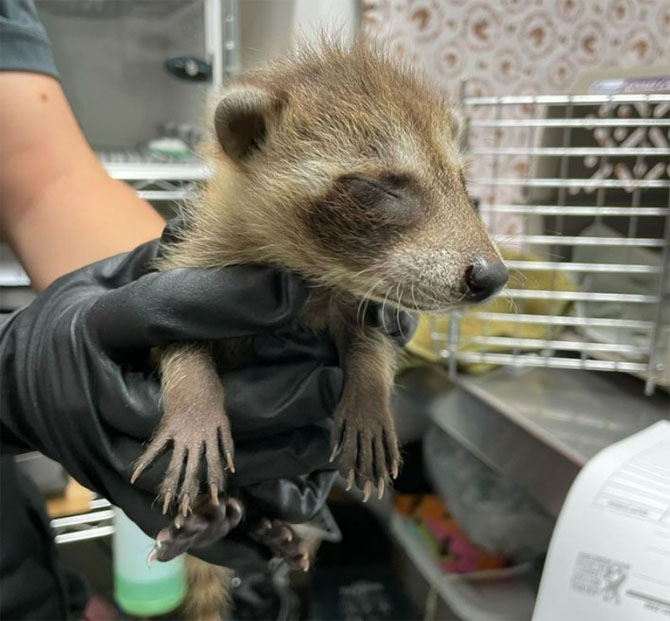Wednesday, September 18, 2024
Community Guide
 Orphaned baby raccoon in AWLA’s Wildlife Resource Center
Orphaned baby raccoon in AWLA’s Wildlife Resource CenterAnimal Welfare League of Arlington
2650 S Arlington Mill Dr, Arlington, VA 22206
(703) 931-9241
https://www.awla.org/
What are you supposed to do if you find an injured raccoon in your yard?
Or, what is the best course of action when there is a bird's nest in a tree on your property that your dog or cat just won’t leave alone?
When you are faced with these animal challenges, you should call the Animal Welfare League of Arlington (AWLA). Experts and volunteers at this non-profit organization will provide helpful advice or dispatch Animal Control officers to take necessary actions to get the animals in question to safety. The AWLA can provide support for just about anything animal-related, with the exception of administering medical advice.
“If you have any questions, we are here for you,” Chelsea Jones, Senior Communication Specialist for the AWLA, said. “We have a training hotline, too. It’s just, legally, we cannot make medical recommendations other than bringing in animals to our clinic for vaccines.”
The AWLA offers solutions for just about any vulnerable animal in the community — both domesticated and those who belong in the wild.
Since 1949, the AWLA has had a contract with Arlington County to manage the county’s animal shelter and to provide animal control for the community. The 501(c)(3) organization also adopts out animals from the community to new homes and offers adoption and pet support programs to residents of Arlington County and the City of Falls Church.
As for animal control, the AWLA provides a wide swath of services. The organization employs seven Animal Control officers, including a chief and a sergeant.
“The primary services we provide on the animal control side pertain to wildlife care,” Jones said. “Our Animal Control officers are a mix of law enforcement and community support. First and foremost, will assist with injured and orphaned wildlife. They will also take care of issues like off-leash dogs, bite incidents, and animal neglect cases — which thankfully in our jurisdiction is rare. They can issue tickets and violations in these scenarios and go to court; they are law enforcement officers of the county. However, they also expose the community to all the support services the AWLA provides. They hand out vouchers for microchips and vaccines, for example.”
In caring for wildlife, Animal Control officers will address issues with animals in a full spectrum of scenarios, so long as the situation doesn’t fall under the category of “nuisance wildlife” — or animals in unfinished spaces of a home or property.
For example, they extract animals from properties — as long as they are within the confines of finished areas — and safely transport injured animals to certified rehabilitation specialists across Northern Virginia.
“We once got a call from a homeowner about a snake in their toilet,” Jones said. “An officer then went onsite to remove it.”
The Animal Control officers work very closely with the members of the AWLA team who focus on rescue and adoption efforts.
“We all work very closely together,” Jones said. “When the officers bring animals in, they come into our care first. We are all part of the same team.”
With regard to domesticated animals in its jurisdiction, the AWLA takes the lost and stray into its care — either into the shelter or into one of its many foster homes. The team will also take surrendered pets from residents of Arlington County and the City of Falls Church for rehoming.
“We do urge people to contact us before they need to rehome their pets,” Jones said. “We can work with people and prepare better for intake. This is a judgment free zone.”
What makes the AWLA different from other county animal service organizations is that the group aims to keep animals with their loving owners — not to take in every animal into the shelter without question.
“We are different from other animal services organizations because we aren’t a government agency,” Jones said. “We are here to provide support to the community, helping with lost and found pets, providing support to people struggling financially with pets, people who need help with pet food, and more. We are really focusing on more community support as opposed to taking every single animal. We want to keep them in homes with the people they love.”
The most utilized AWLA services and programs for residents of Arlington County and the City of Falls Church, Jones said, are the clinics that provide low- and no-cost rabies and distemper vaccines and the pet food pantry, which “provides people with pet food and other essentials to whoever needs it.”
Other services include microchipping, community care clinics — which provide veterinary care for pets as well as human wellness resources and support, spay and neuter financial assistance, training classes, and a behavior hotline.
“Veterinary care is very expensive for people,” Jones said. “If we can keep pets healthy by providing these services, then we want to provide them.”
The AWLA touches all lives in the community — the animals in the wild, wildlife that may be stuck indoors or on someone’s property, and pets who need new homes, and the pets who are already in loving homes. By providing a full spectrum of animal support services, the AWLA also keeps people healthy and happy. For the AWLA, animal services are people services, too.
To learn more about the AWLA, visit www.awla.org.